
Journalist Malala Maiwand is the latest victim of targeted killings in Afghanistan. Apart from working as a journalist, Malala actively campaigned for women rights in her conflict-ridden country. The slain journalist was gunned down with her driver, Mohammad Tahir, on her morning commute to work in Jalalabad, the capital of eastern Nangarhar province in eastern Afghanistan earlier today.
Global terror group Islamic State (IS) has claimed responsibility for the assassination. The Taliban, who were being seen as the most likely perpetrators, denied involvement in Maiwand's murder and have not claimed responsibility for other recent killings either. A month before Maiwand's assassination car bombs were used to assassinate a leading journalist in Southern Helmand, Elyas Dayee, and a prominent former TV news presenter in Kabul, Yama Siawash.
Malala Maiwand was a journalist at Enikass TV and Radio and she comes from a family that has already witnessed an assassination for daring to fight for change in the war-torn country. Five years ago Maiwand's mother, also a women's rights activist, was killed by unknown gunmen.
Maiwand was one of the few leading journalists who spoke up against terror and about the challenges that come with being a female journalist in the country.
Prominent figures and human rights organisation have spoken up against targeted killings in Afghanistan and have called for an investigation into the murder of Malala Maiwand.
Condemning the killing, the UN mission noted that it was “particularly shocking that her life was taken on International Human Rights Day”.
Nai, an organisation that supports media in Afghanistan, said in a statement: "With the killing of Malalai, the working field for female journalists is getting smaller and journalists may not dare to continue their jobs the way they were doing before."
British Ambassador to Afghanistan, Alison Blake, condemning the killing tweeted: "We must unite to uphold press freedom, their deaths must be investigated and their killers face justice for this wicked act. We join in expressing our condolences and condemnation of the murders of journalist Malala Maiwand and her driver this morning #NotATarget."
Even though women in different fields have made huge advancements in Afghanistan since the 2001 toppling of the Taliban regime, they are still fighting against a society where they face discrimination, widespread violence. In some areas, they also remain deprived from access to education, healthcare and work opportunities.
Global terror group Islamic State (IS) has claimed responsibility for the assassination. The Taliban, who were being seen as the most likely perpetrators, denied involvement in Maiwand's murder and have not claimed responsibility for other recent killings either. A month before Maiwand's assassination car bombs were used to assassinate a leading journalist in Southern Helmand, Elyas Dayee, and a prominent former TV news presenter in Kabul, Yama Siawash.
Malala Maiwand was a journalist at Enikass TV and Radio and she comes from a family that has already witnessed an assassination for daring to fight for change in the war-torn country. Five years ago Maiwand's mother, also a women's rights activist, was killed by unknown gunmen.
Maiwand was one of the few leading journalists who spoke up against terror and about the challenges that come with being a female journalist in the country.
Prominent figures and human rights organisation have spoken up against targeted killings in Afghanistan and have called for an investigation into the murder of Malala Maiwand.
Condemning the killing, the UN mission noted that it was “particularly shocking that her life was taken on International Human Rights Day”.
Nai, an organisation that supports media in Afghanistan, said in a statement: "With the killing of Malalai, the working field for female journalists is getting smaller and journalists may not dare to continue their jobs the way they were doing before."
British Ambassador to Afghanistan, Alison Blake, condemning the killing tweeted: "We must unite to uphold press freedom, their deaths must be investigated and their killers face justice for this wicked act. We join in expressing our condolences and condemnation of the murders of journalist Malala Maiwand and her driver this morning #NotATarget."
Even though women in different fields have made huge advancements in Afghanistan since the 2001 toppling of the Taliban regime, they are still fighting against a society where they face discrimination, widespread violence. In some areas, they also remain deprived from access to education, healthcare and work opportunities.
